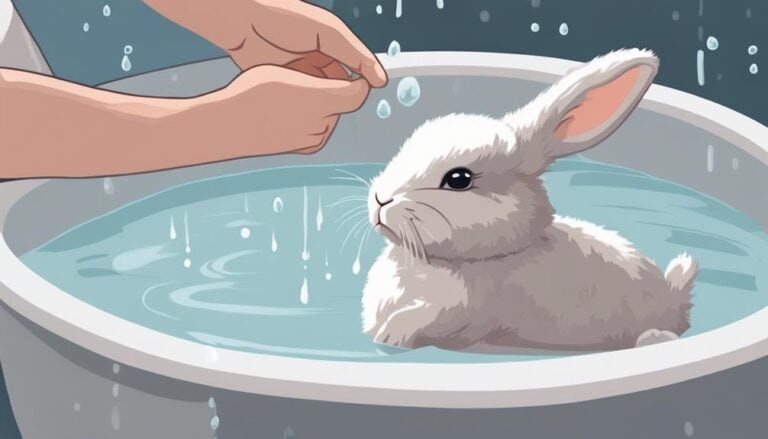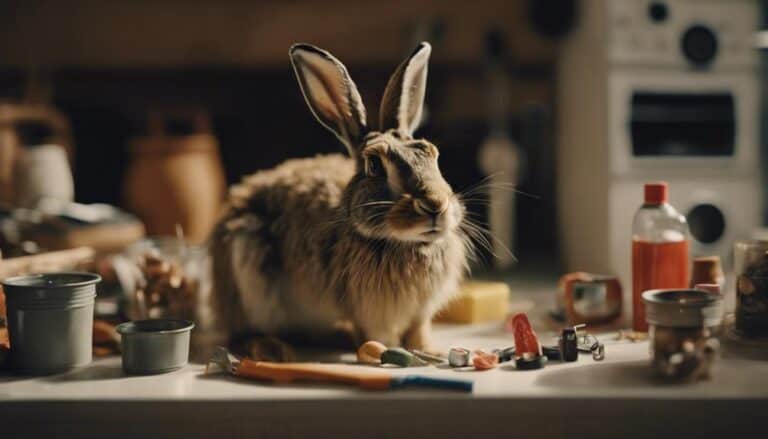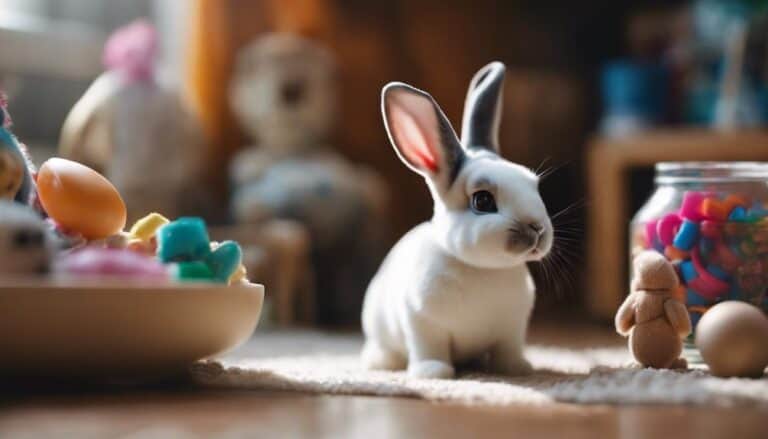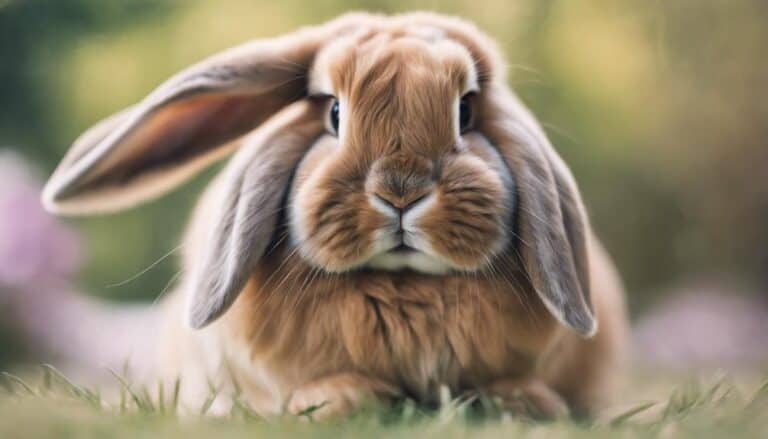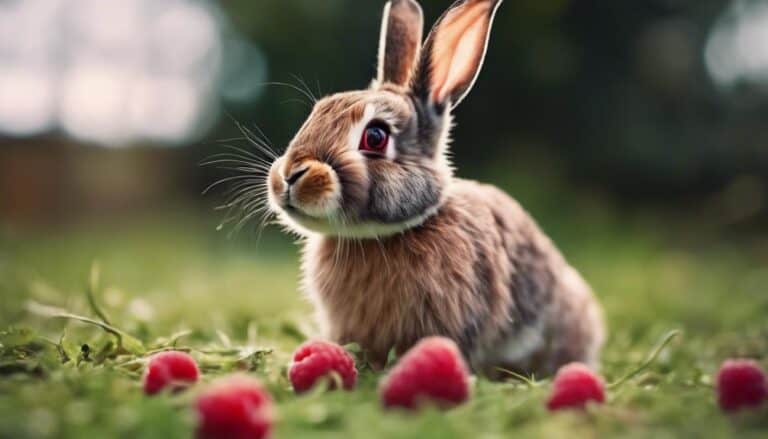Imagine you're meandering a maze of dietary choices for your furry friend, pondering if bunnies can nibble on crackers.
Before you offer a crumb to your bunny, consider the implications of introducing such a snack into their diet.
The answer isn't as straightforward as you might think, and understanding the nuances could be pivotal for your bunny's well-being.
Contents
- 1 Key Takeaways
- 2 Types of Crackers for Rabbits
- 3 Saltine Crackers for Bunnies
- 4 Ritz Crackers and Rabbits
- 5 Graham Crackers and Bunnies
- 6 Goldfish Crackers for Rabbits
- 7 Animal Crackers and Bunnies
- 8 Effects of Crackers on Rabbits
- 9 Risks of Feeding Crackers to Bunnies
- 10 Safe Treat Alternatives for Rabbits
- 11 Frequently Asked Questions
- 12 Conclusion
Key Takeaways
- Crackers lack fiber, causing digestive issues in bunnies.
- High salt, sugar, and fat content in crackers pose health risks.
- Opt for natural, high-fiber foods to support rabbits' dietary needs.
- Avoid crackers to prevent obesity, digestive problems, and nutritional imbalances in bunnies.
Types of Crackers for Rabbits
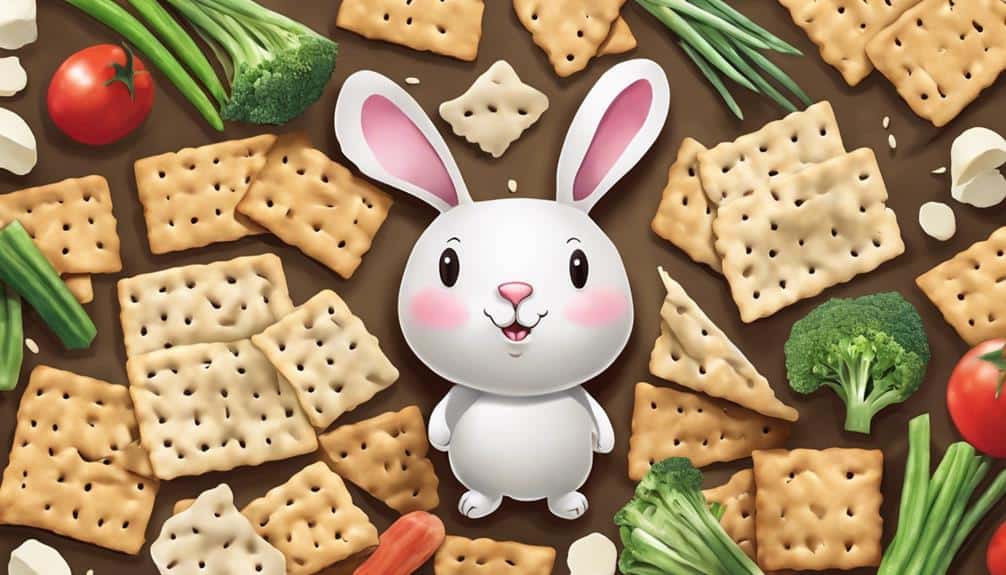
When considering types of crackers for rabbits, it's essential to prioritize their dietary needs and digestive health over convenience or variety. Rabbits have specific dietary requirements that differ from humans. While crackers like Ritz crackers, Graham crackers, Goldfish crackers, and Animal crackers may seem like a fun treat, they can be harmful to your rabbit's health.
Rabbits Eat Ritz crackers, which are low in fiber and contain trans fats, can pose a risk to your rabbit's digestive health if consumed regularly. Rabbits Eat Graham crackers, which are high in sugar and low in fiber, can lead to bacterial overgrowth in their intestines if given in large amounts. Rabbits Eat Goldfish crackers, which are high in sodium and contain ingredients like cheddar cheese and onion powder, aren't suitable for rabbits. Rabbits Eat Animal crackers, shaped like animals and high in calcium, sugar, salt, and calories, should be avoided due to their nutritional composition.
Choosing the right types of crackers for your rabbit is vital for maintaining their well-being and ensuring they lead a healthy and happy life.
Saltine Crackers for Bunnies
Saltine crackers aren't recommended for bunnies due to their low fiber content, high starch levels, and saltiness, which can potentially lead to digestive issues if consumed. Rabbits require a high-fiber diet to maintain their digestive health, and saltine crackers don't provide the necessary nutrients for their well-being.
The low fiber content in saltine crackers can result in gastrointestinal problems for rabbits if consumed regularly. If you choose to offer saltine crackers as an occasional treat, it's important to provide them in very small amounts to prevent digestive issues in your furry friend.
Opting for healthier alternatives like fresh vegetables and Timothy hay is a more suitable choice to make sure your rabbit receives the essential nutrients it needs. By incorporating these high-fiber options into your rabbit's diet and limiting saltine crackers, you can help promote a healthy digestive system and overall well-being for your beloved pet. Remember, moderation and a balanced diet are key to keeping your bunny happy and healthy.
Ritz Crackers and Rabbits

Ritz crackers may be a tempting snack, but for rabbits, they pose potential risks due to their low fiber and high fat content. Feeding rabbits Ritz crackers in large quantities could lead to digestive complications, making them unsuitable for regular consumption by these delicate animals.
Instead, prioritize your rabbit's well-being by offering high-fiber foods like hay and vegetables as healthier alternatives to Ritz crackers.
Ritz Crackers Safety
Avoiding Ritz crackers in a rabbit's diet is essential for maintaining their digestive health and overall well-being. Ritz crackers are low in fiber and high in trans fats, making them unhealthy for rabbits.
The high carbohydrate content in Ritz crackers can lead to digestive issues and potential health problems. While limited amounts of Ritz crackers may be given as an occasional treat, they shouldn't be a staple in a rabbit's diet.
It's vital to prioritize high-fiber, rabbit-safe foods over Ritz crackers to guarantee the health and longevity of pet rabbits. By steering clear of Ritz crackers and opting for healthier alternatives, you can help your rabbit avoid unnecessary digestive complications and lead a happier, healthier life.
Rabbit's Digestion Process
With their delicate digestive systems requiring a high-fiber diet for proper function, rabbits must avoid low-fiber, high-fat snacks like Ritz crackers to prevent gastrointestinal issues. It's important to understand the rabbit's digestion process when considering their dietary needs.
- Rabbits have sensitive digestive systems that need a high-fiber diet to maintain gut health.
- Ritz crackers, due to their low fiber and high unhealthy fat content, can lead to digestive disturbances in rabbits.
- Excessive consumption of Ritz crackers may result in gastrointestinal problems for rabbits.
- Offering Ritz crackers as an occasional treat is acceptable, but it shouldn't be a regular part of their diet.
- Opting for rabbit-safe foods that are high in fiber is the best way to support your rabbit's digestive health.
Rabbit Treat Alternatives
Consider incorporating leafy greens or fresh herbs as healthier alternatives to Ritz crackers when selecting treats for your rabbit. Ritz crackers, with their unhealthy nutritional content, should only be given to rabbits as an occasional treat in minimal amounts to prevent digestive issues.
Opting for fresh vegetables or herbs as treats can help maintain your rabbit's health and provide necessary nutrients. Prioritize your rabbit's dietary needs by avoiding regular feeding of Ritz crackers. Fresh vegetables like kale, cilantro, or basil can be exciting and beneficial treats for your rabbit.
Graham Crackers and Bunnies
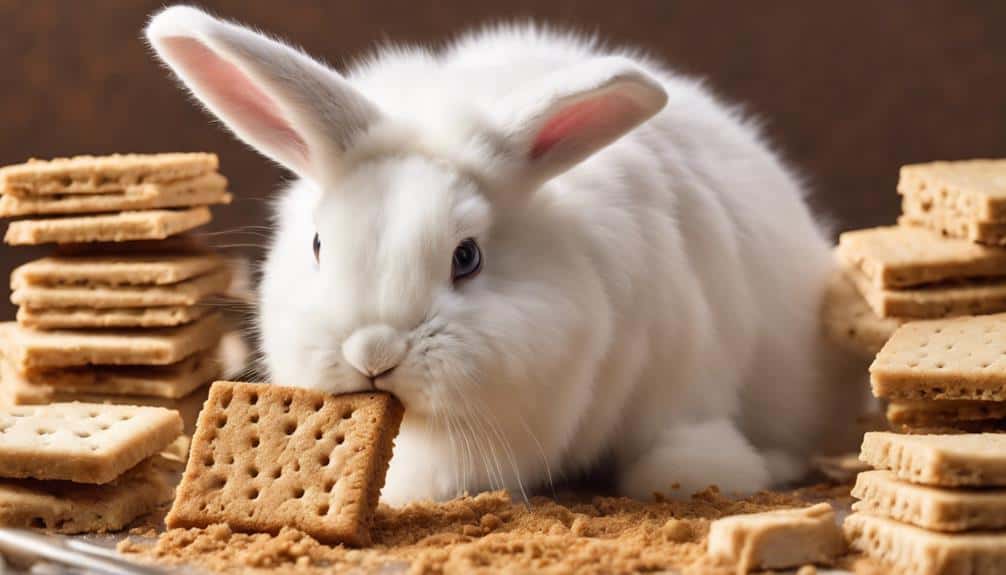
When pondering graham crackers as a snack option for bunnies, it's important to be aware of their high sugar and low fiber content. Here are some key points to contemplate:
- Graham crackers are unsuitable for rabbits due to their high sugar content.
- The low fiber in graham crackers can negatively impact a rabbit's digestive health.
- Regularly feeding graham crackers to rabbits can lead to digestive issues and potential health problems.
- If offering graham crackers, it should only be in very small quantities as an occasional treat.
- Opting for healthier, high-fiber snack options is preferable over graham crackers for your bunny's well-being.
Goldfish Crackers for Rabbits
When thinking about snacks for your bunny, it's important to steer clear of Goldfish crackers due to their high sodium, lack of fiber, and ingredients like cheddar cheese that can be difficult for rabbits to digest. Rabbits have a delicate digestive system that thrives on a diet rich in hay and fresh, high-fiber vegetables. Feeding your rabbit small amounts of treats should be approached with caution to prevent any digestive upsets.
Goldfish crackers are far from the ideal choice for your rabbit due to their high sodium and MSG content, lack of essential nutrients, and the presence of ingredients like onion powder, which can be toxic to rabbits. Opting for hay and fresh veggies as treats won't only keep your bunny healthier but also guarantee their digestive system functions properly. Remember, a rabbit's diet should primarily consist of hay and fresh greens to maintain their well-being.
Animal Crackers and Bunnies
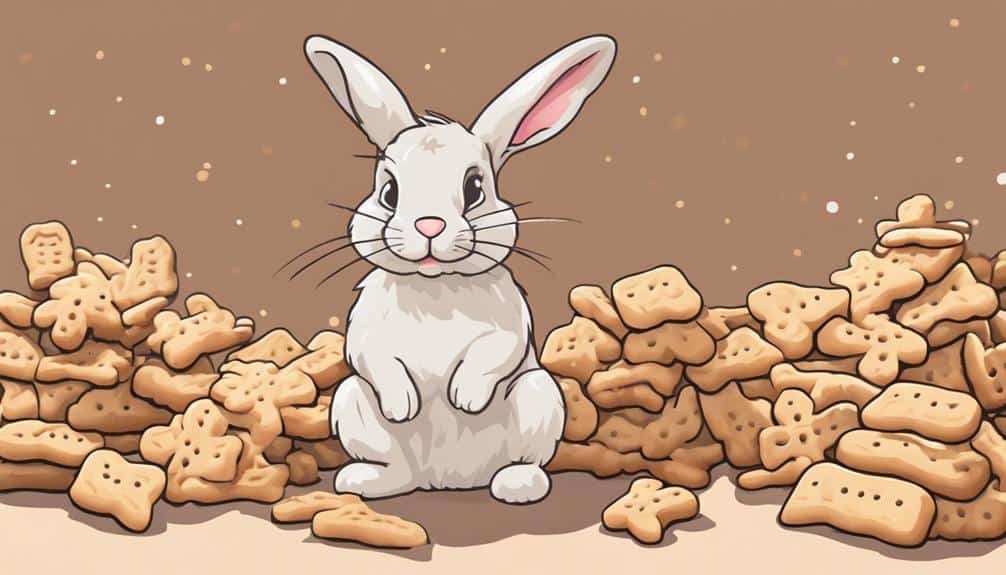
High in calcium, magnesium, phosphorus, sugar, salt, carbohydrates, and calories, animal crackers aren't a suitable snack choice for rabbits due to their high sugar and salt content, which can be harmful to their health.
- Feeding your rabbit animal crackers can lead to health issues.
- These crackers are unsuitable for rabbits due to their high sugar content.
- Rabbits need a diet high in fiber, which animal crackers lack.
- Animal crackers can be poisonous to rabbits if consumed.
- To keep your rabbit healthy and happy, avoid feeding them animal crackers and opt for fresh vegetables instead.
Effects of Crackers on Rabbits
Feeding your rabbit crackers, such as saltine, Ritz, graham, or Goldfish varieties, can have detrimental effects on their digestive system and overall health due to their high carb, salt, fat content, and lack of essential fiber. Rabbits are herbivores with sensitive digestive systems that require a diet high in fiber to maintain ideal health. When crackers, which are high in carbohydrates and low in fiber, are introduced into a rabbit's diet, it can lead to various health issues such as gastrointestinal problems. Here is a table highlighting some effects of specific types of crackers on rabbits:
| Type of Cracker | Health Impact |
|---|---|
| Saltine | Lack of fiber affects digestive system |
| Ritz | Trans fats can be harmful to rabbits if consumed regularly |
| Graham | High sugar content disrupts digestion |
It's important to prioritize your rabbit's health by providing a balanced diet that supports their specific dietary needs.
Risks of Feeding Crackers to Bunnies
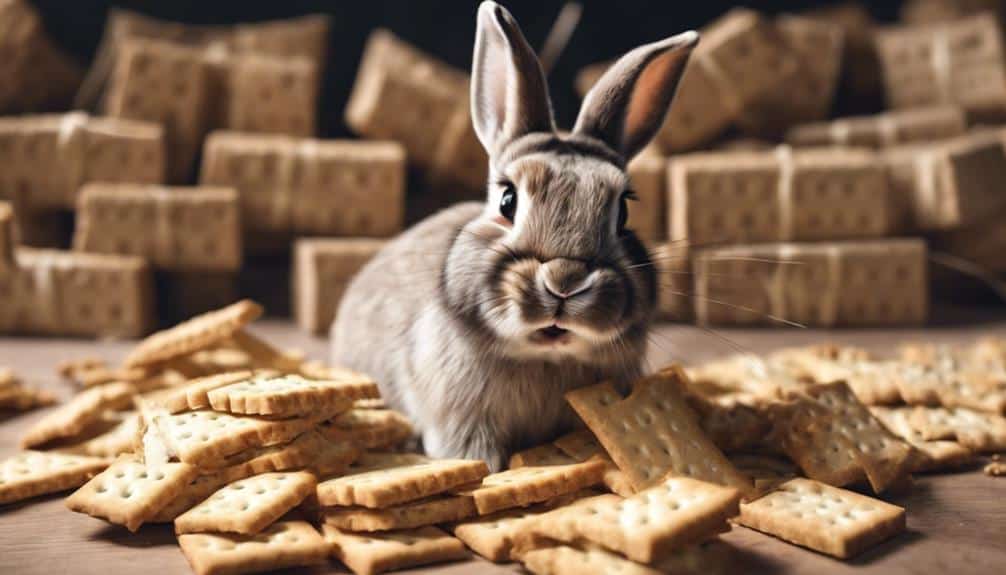
Feeding crackers to bunnies poses health risks due to their high carb, salt, sugar, and fat content, which are unsuitable for their diet. This can lead to issues such as obesity, digestive problems, and nutritional imbalances, affecting the well-being of your rabbit.
Opting for natural, high-fiber foods like hay, vegetables, and limited fruits is vital to guarantee your bunny's best health and avoid these potential risks.
Health Concerns With Crackers
When considering the health of your bunny, it's important to be aware of the risks associated with feeding crackers.
- Saltine crackers aren't suitable for rabbits due to their high salt content, which can lead to health issues like salt toxicity and nutritional imbalance.
- Ritz crackers should be avoided for rabbits as they're high in fat and salt, potentially causing digestive problems and nutritional imbalance.
- Graham crackers aren't recommended for rabbits as their high sugar content can disrupt digestive health and lead to nutritional imbalance.
- Goldfish crackers aren't suitable for rabbits due to their high salt and fat content, lack of fiber, added flavors, and preservatives, posing risks of gastrointestinal problems.
- Animal crackers, while shaped like animals, aren't ideal for rabbits due to their high sugar content, low fiber, and potential for digestive issues, making them an unsuitable snack option.
Digestive Issues in Bunnies
To maintain your bunny's digestive health, refraining from offering crackers as treats is essential to guarantee potential stomach discomfort and bloating.
Rabbits have a sensitive digestive system, and crackers are low in fiber, high in fat, and can cause digestive issues. The high carbohydrate content in crackers can disrupt the delicate balance of your rabbit's digestive system, leading to problems like obesity and gastrointestinal distress.
It's difficult for rabbits to digest crackers properly due to their lack of fiber, which is essential for their digestive health. Regularly feeding crackers to your rabbit can increase the risk of digestive complications, so it's best to avoid this snack to secure your bunny's well-being.
Nutritional Imbalance Risks
Indulging your bunny with crackers poses significant risks of nutritional imbalance due to their high carbohydrate content. When considering feeding crackers to your bunny, it's important to understand the implications it may have on their health:
- Crackers lack the necessary fiber that rabbits need for proper digestion.
- Excessive consumption of crackers can disrupt your rabbit's unique digestive system.
- The high levels of salt, sugar, and fat in crackers can lead to health issues in rabbits.
- A diet high in crackers and low in fiber can promote the growth of bad bacteria in your bunny's gut.
- Avoiding crackers and opting for high-fiber, rabbit-safe foods is essential to prevent nutritional imbalance and maintain your bunny's health.
Safe Treat Alternatives for Rabbits
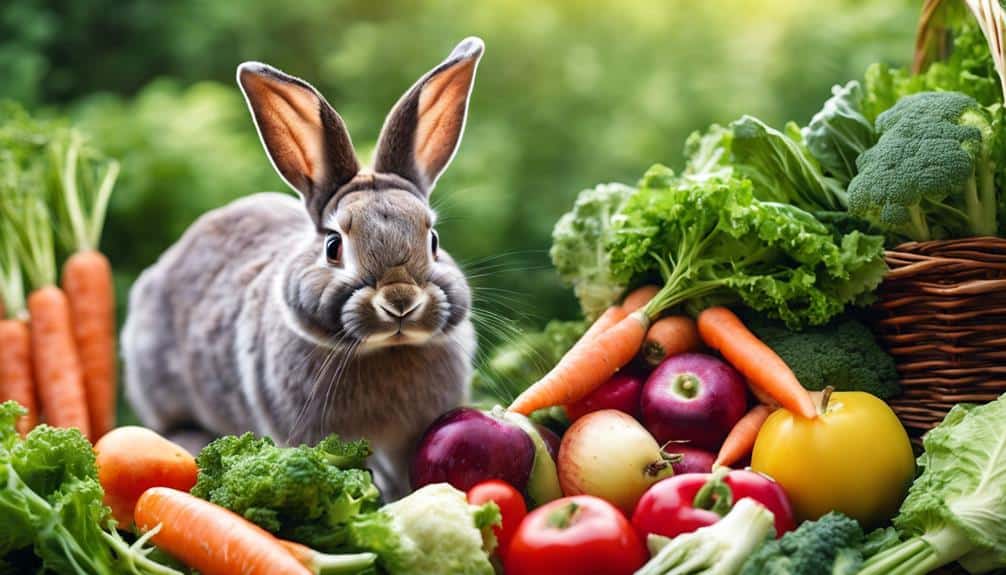
For rabbits, it's important to contemplate safe treat alternatives that provide essential nutrients and support their overall well-being. When considering safe treat options for your rabbit, focusing on a well-rounded rabbit diet is key. Opt for healthy treats such as fresh vegetables like green peppers and Brussels sprouts. These low-carb, high-fiber snacks not only offer a tasty variety but also provide the necessary nutrients for your rabbit's health.
Incorporating a mix of fresh veggies and herbs as snacks can help guarantee proper nutrition for your furry friend. Avoid high-fat options like walnuts and instead, choose treats that are high in fiber to promote their overall well-being. Remember, a diet rich in Timothy hay, vegetables, and herbs is essential to maintain proper nutrition for rabbits.
Frequently Asked Questions
Can Rabbits Have Cracker?
You should avoid giving rabbits crackers as treats. Their diet requires high-fiber, natural foods for best health. Opt for nutritionally balanced snacks over processed options. Prioritize your rabbit's well-being by choosing suitable treats that support their nutritional needs.
What Food Bunnies Cannot Eat?
You should avoid feeding bunnies toxic plants, harmful vegetables, dangerous fruits, unsafe herbs, poisonous flowers, inedible treats, and toxic nuts. Stick to a diet of hay and fresh veggies to keep your bunny healthy and happy.
Can I Give My Bunny a Graham Cracker?
You should avoid feeding your bunny graham crackers. Instead, consider healthier bunny treats and snack options that meet their nutritional needs and support digestive health. Opt for safe snacks and incorporate more bunny-friendly foods into their diet.
What Human Food Can I Give My Bunny?
When considering what human food to give your bunny, focus on carrot treats, fruit snacks, leafy greens, and other healthy options. Incorporate these into their diet along with hay treats and vegetable snacks for a balanced bunny diet.
Conclusion
In conclusion, crackers aren't suitable for rabbits due to their high carb, salt, sugar, and fat content. Feeding your bunny crackers can lead to health issues like obesity and digestive problems.
It's best to stick to rabbit-safe foods high in fiber to guarantee their optimal health. Remember, when it comes to treating your bunny, it's important to choose wisely to keep them hopping happily along the right path to good health.

